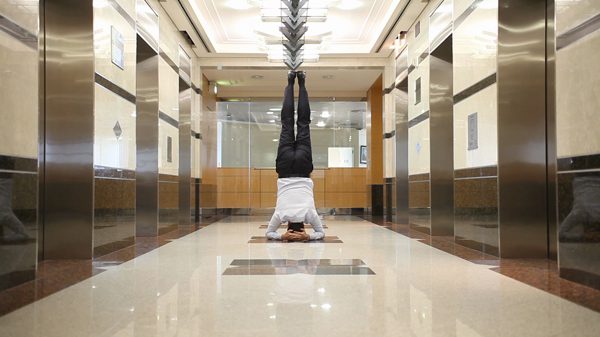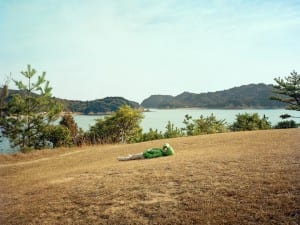Turkish artist Burak Delier’s exhibition Freedom Has No Script including a new commission by Iniva opened at Rivington Place last week. The artist explores the relationship between capitalism and art, mixing seriousness and wit to critique society in a way that is relevant to his native Turkey and beyond. We caught up with Delier to ask him some questions about the essence of his art and his understanding of his own work.
A: Freedom Has No Script is your first major exhibition in the UK and you are also the first recipient from Iniva’s Commissions and Exhibitions Fund. It includes works from 2013 and also the new commission by Iniva, Songs of the Possessed. Could you please tell us how the concepts of your works from 2013 and the idea for this new commission “breathe” in harmony?
BD: Broadly speaking the exhibition discusses the notion of freedom. It poses certain questions such as: Is not working freedom? Are we enslaved by work while we want to become free? How can we get rid of predetermined ways of freedom that are imposed upon us? Some works in the exhibition are unusual experiments realized with real people. For example, in The Deal I worked with a freelance trader and in the Collector’s Wish I asked a renowned collector if he wants to produce an artwork. In the video installation titled Crisis and Control we see actual white-collar workers standing in yoga positions while they speak about their jobs. All works are discussing the ethos of good life imposed through “flexible”, “creative” capitalism. Generally, as the title of the exhibition points out, the idea of freedom is paradoxical and complex. We are often exploited by a scripted idea of freedom: “If you do this and not that, you’ll be free!” Actually this is wrong; any clear-cut idea of freedom eradicates the very possibility of freedom. Only when we don’t exactly know which way to follow, when we feel uncertain do we become available for the experience of freedom.
A: To what extent would you say your work is political? Is it correct to view your work from a solely political and economic viewpoint, linking it to political protests such as the Gezi Park protests of May 2013?
BD: The works in the exhibition cannot be linked directly to Gezi Park. They are not political in the sense that they represent politics and protests. I am not interested in representative gestures of protest which I think are mistakenly called “political art”. But there is an indirect connection between what I think happened in Gezi Park protests and the works in the exhibition. The title stemmed from my thoughts on Gezi Park. I think that through the lack of any scripted agenda or a leader to follow, multiple practices of freedom and solidarity had become possible in Gezi Park. Suddenly everyone turned out to be a resistance unit of their own. These practices were based on ad hoc improvisation and free experimentation. And this idea of experimenting and improvisation can be linked to various scenarios that we see in artworks. Art is ineffective when it tries to be political or critical, but it also has a powerful potential as an unorthodox educative field for unusual experiments.
A: In your work you also delve into a massive critique of the labour market. In works such as Crisis and Control and Songs of the Possessed you bring out the inner dialogue employees have with themselves as well as the dialogues they have with their bosses and colleagues, and portray white-collar workers concerns, fears and anger in view of the lives they are leading. Why do you think people continue to go through with the stresses of the labour market day in day out?
BD: Actually my aim is not to come out with a cut-and-dried critique of labour market. Criticality is problematic, especially in art world. Many critical positions are given and predetermined, and as artists this makes us lazy and comfortable. I think there is another form of critique that is linked to the endeavour of searching alternatives and experimenting. The video installation Crisis and Control shows people struggling to endure. They try to stand in odd positions and they talk as if everything is ordinary. They seem blind to their situation. I must say that the desire to keep things going and ignoring obvious facts is not the field of expertise of office workers. We all have this desire to succeed and that is probably why we mostly choose to invest in given scripts of good lives and ignore their inconvenience. We will become open and more potent when we get rid of this desire to succeed and so-called good life. Songs of the Possessed is an experiment on the notions of working, communicating and acting. In contemporary companies, work is detached from the material world and is more communicational and psychological. Work is no longer about producing things but managing oneself and manipulating relations. And while doing this, there is a mandate of being true and authentic which is by definition contradictory. While Crisis and Control is about individuals and the small tragedies of everyday life, Songs of the Possessed presents an exploration of the contemporary mode of production.
A: As an artist, how do you stray away from seeing your work as “work” to bring out the wittiness of your imagination? Do you ever feel knotted up like the “employees” in Crisis and Control?
BD: Of course! But in art one is able to make art from one’s weakness and failure. I must admit that I am not a good worker. I suffer from a lack of patience. If I were a good worker I wouldn’t have become an artist. However, that doesn’t mean that art cannot become work. It can, very easily. When I feel that my production is starting to become work-like, I withdraw from it. My tactic is not to work, for me, my art is a tool of resistance against control structures and work is probably the most pervasive and sinister form of control. We were once told that we will be emancipated through work, as the banner in the entrance of Auschwitz says “Arbeit Macht Frei”. Our slavery was given; through work we should have been freed. Yet today it seems it is freedom that makes us work. This is different from the mentality of 50 years ago. We now think that we already have freedom and that all we have to do is to work in order to keep it. This form of power in which one thinks that one is already lucky is more difficult to struggle against than openly repressive and disciplinary forms of power. Besides I see my production as a form of educative discussions based on experiments on agency. So the far goal is agency and autonomy rather than a work-based, quick-fix art production.
A: Another brilliant work from the exhibition is Notes from my Mobile, in which there is an incessant self-critique. At a certain point, you even say, “I am over-criticising myself” through which you criticise yourself, the way you undertaken your work, and the way you think. There is a great element of humour in this vicious circle. However, there are many people out there who are criticising themselves all the time, in the hope that it will make them become better at their jobs and relationships, which would in a sense of straight logic help them achieve a sense of reaching “economic nirvana”. Do you think the viewers of this work will understand the perspective from which you are approaching life?
BD: I think so, because self-critique is the motor of our lives and personalities. We are obsessed with ourselves and mobiles with cameras have changed our relation to ourselves. This is very obvious when we think of the recent trend of “selfies” and the working mentality of the social media. It is based on the production and modelling of selves. Mobiles are the lake of today’s Narcissus. In reality, the words that I say to myself in the video aren’t mine. They are coming from my mouth but it is not me who speaks. It is the dominant ethos of the self-speaking. A voice that pushes, criticizes and humiliates in order to make you a decent and successful person. That is why everybody can connect to and recognize these words. The video is placed in a box so that the viewer can peek into the realm of the video from the hole at the front of the box. This form of installation creates an effect of intimacy. As if we are peeking into somebody’s inner world. However, the words are paradoxically common and recognizable by anyone. What we think is the most personal becomes the most common. This is where the form of power that operates through ourselves and functions from inside becomes visible.
A: Would you say your attitude towards work is similar to the subject of Homage to Balotelli’s Missed Trick?
BD: Yes, when I encountered Balotelli’s move, it wasn’t clear to me why I was attracted to this moment but I eventually I understood. In this football match against the USA team Galaxy, Balotelli wastes an open opportunity to score. He runs towards the ball but when he reaches it, suddenly he gives up, decides not to score, turns the ball in the opposite direction and slowly sends it out with his heel. He probably didn’t plan to do this before the match. He performs the most forbidden behaviour: he wastes an opportunity! In the context of the dominant ethos of success he is a sinner. We can say that he betrays himself or if we want to understand it positively we can also say that he overcomes himself… Between this move and my approach towards art, I do see some overlapping tendencies but I don’t think a general formula of resisting work can be extracted from this…
A: What are your thoughts on being a young and emerging Turkish artist who is probably better followed elsewhere around the globe than in Turkey?
BD: Living and producing in Istanbul, Turkey has its own advantages. I never thought that art was a career. It is obvious but also worth saying that if I wanted to follow an art career I wouldn’t have stayed in Istanbul. Western countries have established institutions, and art is only one of them. Law, education, social security institutions etc. even if eroded recently, they function for the better or worse. However, paradoxically this makes it harder to produce meaningful art. In London, Berlin or New York an artist is just an artist. He or she is trapped in an institutionalized and established field. In Turkey, neither the law nor the state or the art is institutionalized to a degree of competency. Thus, I have more possibilities to engage with the public and become more than just an artist. In short, in the west it is hard to create cracks in order to see the light, but in Turkey, there are so many cracks that there isn’t a ceiling.
Freedom Has No Script will be on display at Iniva, Rivington Place until May 17, 2014.
Credits
1. Burak Delier, Crisis and Control, 2013, HD Video, 14” 12”.
Words: Hande Eagle





